Oregon’s the first state to ticket narcotics users, but reform has yet to live up to what was promised
This story was produced as part of larger project for the USC Center for Health Journalism's 2021 National Fellowship.
Other stories include:
Kim Foxx’s ex-trainer caught up in ‘unending cycle’ of drug arrests; ‘It breaks my heart’ by Frank Main, Jared Rutecki and Casey Toner
The costly toll of dead-end drug arrests — a Sun-Times / BGA special report by Frank Main, Jared Rutecki and Casey Toner
Dead-End Drug Arrests: How We Reported This Story by Jared Rutecki and Casey Toner
New Illinois law gives cops choice not to jail people for small amounts of drugs — a follow-up to our ‘Costly toll of dead-end drug arrests’ investigation by Frank Main, Jared Rutecki and Casey Toner
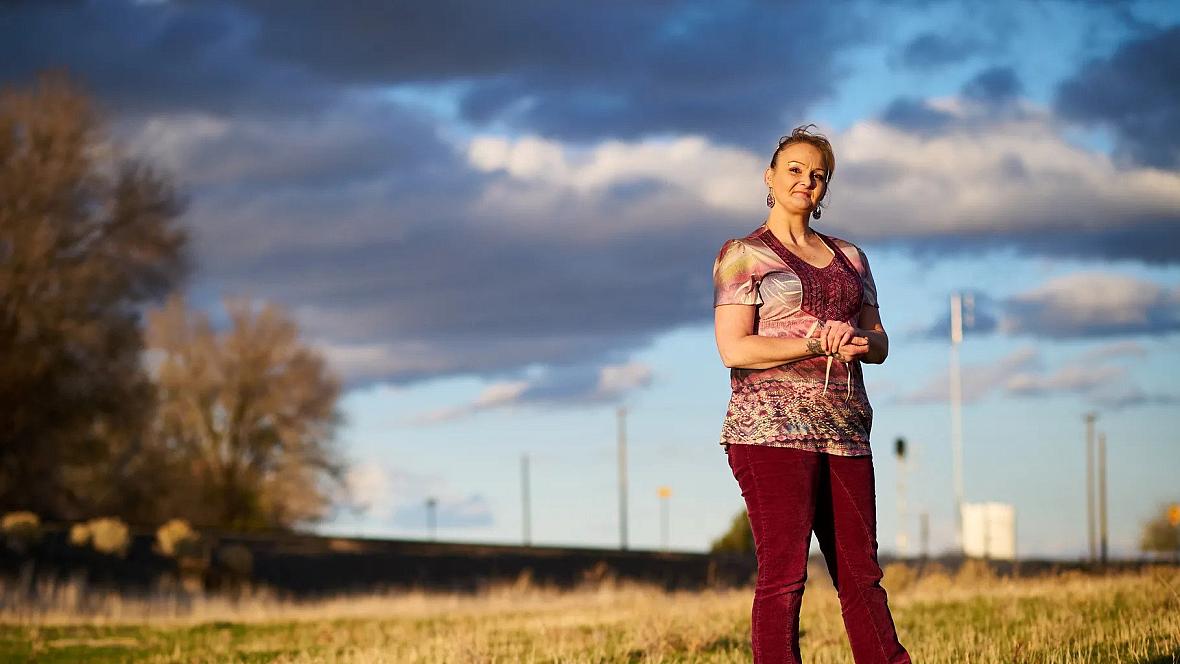
Alicia Hume, 42, outside her home in Metolius in central Oregon.
Joe Kline / Sun-Times
MADRAS, Oregon — Alicia Hume feared she was headed to jail after a sheriff’s deputy pulled over her borrowed Volkswagen Beetle and saw her put a bottle of eight fentanyl-laced oxycodone pills in her bra.
She faced a misdemeanor drug possession charge that could mean up to a year in jail, more than $6,000 in fines and court-ordered addiction treatment.
The Jefferson County, Oregon, sheriff’s deputy charged her but used his discretion to let the 42-year-old mother of two drive away that September night. Prosecutors later dropped her case, saying the deputy should have written her a ticket instead of charging her.
That’s because of a new Oregon law — the first in the nation — making possession of small amounts of drugs such as heroin, cocaine and methamphetamine the equivalent of a minor traffic infraction.
Alicia Hume on her porch with her dog Bizzy. Joe Kline / Sun-Times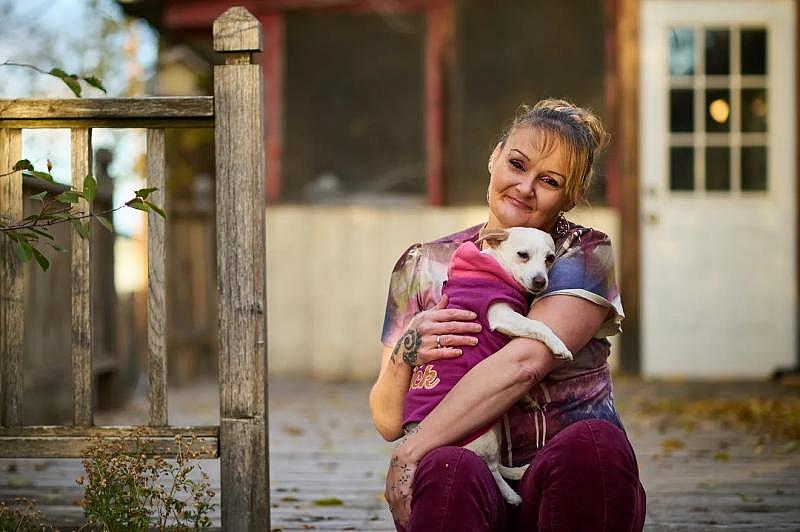
“I was, like, ‘Oh, thank God,’ ” Hume said of her brush with the law in central Oregon.
Hume worried she would suffer from drug withdrawal in jail after her latest arrest.
“I would have been ‘pill sick,’ ” she said. “I was just thinking, ‘Oh, my God, I’m so blessed.’ ”
Since the Oregon law went into effect in February, police officers have written more than 1,300 tickets for drug possession instead of arresting people like Hume, achieving the ballot measure’s aim of keeping people out of jail.
It also steers hundreds of millions of dollars into expanding treatment throughout Oregon, which regularly ranks among the worst states for substance abuse and mental health problems as well as access to care.
But records show few have entered drug treatment through the ticketing system, which the law also was supposed to encourage. And interviews suggest many cops aren’t carrying out their new responsibilities.
A new approach
Touted by supporters as a way to end the “war on drugs,” the controversial Oregon law is part of a trend away from a decades-long practice of using jails to combat drug addiction and toward treating it as a public health crisis.
Oregon already was among states no longer charging low-level users as felons — a tectonic shift from 50 years ago, when Richard Nixon declared drug abuse “public enemy No. 1.”
Last year’s referendum, known as Measure 110, not only ended the practice of jailing drug users but also established new money and new avenues for treatment and counseling.
Oregon's new Measure 110 narcotics "decriminalization" law
Addiction specialists and healthcare professionals widely supported the Oregon measure to decriminalize drug possession, while some in the justice system did not. Here is a list of reasons that people identified as positives and negatives associated with the new law.
PROS
- Keeps people caught with “user” amounts of narcotics out of the criminal-justice system, which can cause cascading problems like the loss of a job and housing.
- Frees up prosecutors to spend more time on violent crimes.
- Provides a path for people to obtain a substance-use assessment, which helps them decide if they want to seek treatment for a drug addiction or related health problems.
- Funds health treatment centers with more than $100 million a year in pro-tax revenue.
CONS
- Led to about 1,300 tickets for low-level drug possession but a low number of calls to a state hotline to get a substance-use assessment during the first half of 2021.
- Takes money away from traditional drug courts in which criminal defendants are compelled to enter a treatment program.
- Won approval on a “false premise” that people no longer would be sent to prison for user amounts. They weren’t getting prison time before the new law passed, critics say.
- Set too low a ceiling for the drug amounts that qualify for a ticket rather than an arrest. Some users say they often carry more drugs than the new law decriminalizes.
Better Government Association, Chicago Sun-Times
Throughout the rest of the country, people go to jail for low-level drug possession. In Illinois, it’s still a felony.
An investigation by the Chicago Sun-Times and the Better Government Association found courts routinely toss out low-level drug possession cases in Chicago in a matter of weeks. But the cost is steep for taxpayers and those arrested, whose brief time in jail on the dead-end charges can devastate their lives.
The analysis used data from The Circuit, a collaborative of news organizations including the BGA and Injustice Watch that compiled Cook County court records from 2000 to 2018.
The BGA and Sun-Times traveled to Oregon to examine the impact of its drug law. As civil rights activists in Illinois push for policy changes, Oregon’s experience shows reform doesn’t always lead to its intended consequences — at least not right away.
Sam Junge (left) and Hannah McDevitt are volunteers with Portland People’s Outreach Project. Here, they’re getting ready to hand out boxes of Narcan, the opioid-reversal drug, in downtown Portland. Casey Toner / BGA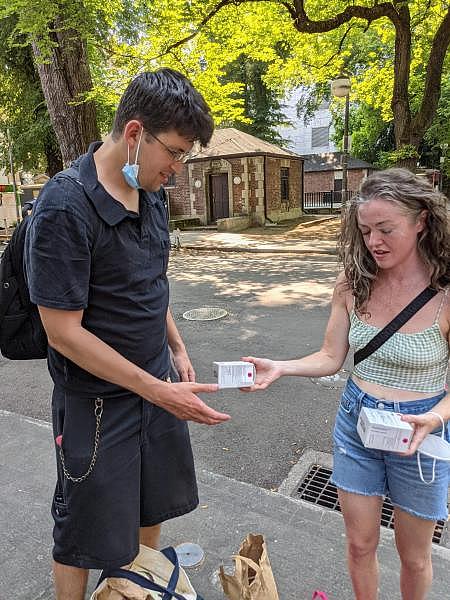
Judge: Law wasn’t getting people into treatment
More than 1.3 million people voted last November for Measure 110, which fortifies the state’s drug-treatment network with more than $100 million a year from existing marijuana tax revenue. Most sheriffs and district attorneys in Oregon opposed it.
Under the new law, passed with 58% of the vote, anyone caught with less than one gram of heroin or two grams of cocaine or methamphetamine should be issued a $100 ticket instead of being arrested. Officers are supposed to confiscate and destroy the drugs, write the user a ticket and send them on their way.
Oregon’s population is mostly white, but Black people were disproportionately targeted by drug arrests in the past. Supporters say Measure 110 should end that disparity, at least for those caught with small amounts of drugs.
The state also will save money because the law will prevent people from being charged and spending time in jail, officials say. About 9,000 people a year were being arrested in cases in which drug possession was the most serious offense, according to the ballot proposal.
Sam Junge, who helps run the volunteer organization Portland People’s Outreach Project, said his group qualified for nearly $450,000 in grant money through the measure. The money will help pay for condoms, pipes, syringes and the overdose reversal drug naloxone, along with rent for space they can use for storage and where people who use drugs can go to relax and charge their phones.
Encampments like this one near Burnside Bridge are often gathering places in Portland, Oregon where drug use occurs Jared Rutecki / BGA
But records and interviews show Oregon’s new law has fallen short of one of its central goals — getting people into drug treatment through law enforcement. It’s a failure advocates of the new measure attribute to growing pains.
Under the law, a state hotline was set up so people who get police-issued drug tickets can call to arrange for a substance-abuse assessment. If they get an assessment or go into treatment, the courts will toss out their fines.
Through Sept. 30 — eight months into the new program — only seven of the more than 1,300 people issued tickets had presented a judge with proof they used the service, according to state records.
Andrew Balyeat, a judge in Bend, Oregon, said most people don’t even show up in his court for hearings about their drug tickets.
“I look at these numbers, and I have to agree with you that, if the goal was for people to get treatment, it doesn’t appear at this time that it’s working,” Balyeat said.
Jacob Stoner, 30, who got a ticket for methamphetamine possession, was a no-show for his Bend, Oregon, court hearing in late October, records show. Had he appeared in court and shown he’d obtained a drug assessment through the state hotline, the judge would have tossed out his ticket.
Andrew Balyeat, a judge in Bend, Oregon, said most people don’t even show up in his court for hearings about their drug tickets. Provided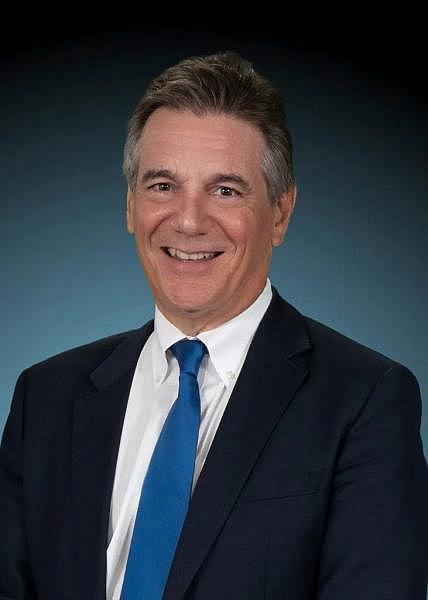
His was the only drug-ticket case on the court’s docket that day. Stoner couldn’t be reached for comment.
The court system is dealing with hundreds of people who failed to appear in court for their drug tickets, according to a state report on the program’s progress.
Those who fail to appear after being issued a drug ticket can’t be charged with a crime, unlike those failing to appear on traffic infractions. But unpaid drug tickets still go through debt collection like any other kind of civil citation.
Hotline woes
Under the law, ticketed people can pay the fine, appeal or call the state’s hotline to arrange to get an evaluation for possible drug treatment and help with other health problems, housing, employment and child care.
If they show the judge they went through the screening or independently got drug treatment within 45 days, their tickets get dismissed, and their fines get wiped away.
The police are supposed to destroy confiscated drugs after they conduct a field test to confirm what they are.
When police officers hand out drug tickets, they’re also supposed to give people a palm card with instructions for calling the hotline, according to Dwight Holton, chief executive officer of the nonprofit Lines for Life, which runs the hotline.
But boxes of the cards sat unopened in police stations, according to Holton and others involved in the implementation of the new measure.
The Jefferson County sheriff’s office — which charged Hume with misdemeanor drug possession before a prosecutor decided she should have gotten a ticket — wrote one drug ticket in the first eight months of the program.
“Even if we wrote them a ticket, there’s no teeth,” said Marc Heckathorn, Jefferson County’s sheriff.
Holton, a former U.S. attorney in Oregon, is pushing for the state to put hotline information on the drug tickets, which he and other advocates think might increase the number of calls.
Sabrina Brandt smokes outside her apartment in Portland, Oregon. A heroin user, she thinks the state’s new drug reform doesn’t go far enough. Casey Toner / BGA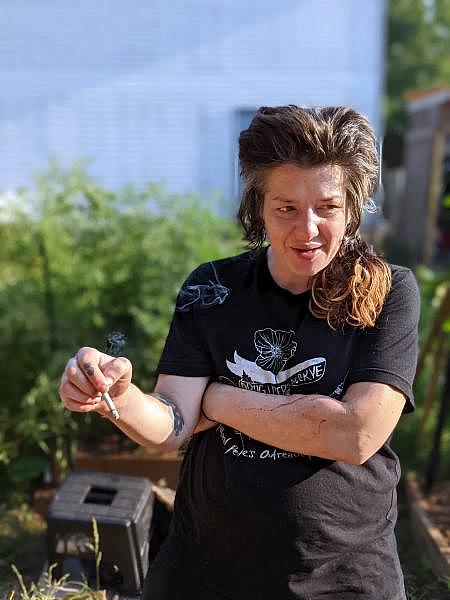
Janie Gullickson, a chief petitioner for the ballot measure, acknowledged that people caught with narcotics might not call the state’s hotline, get substance-abuse assessments and go to court to get their tickets dismissed.
But she said the expanded healthcare funding would help people whether they got a ticket or not, she said. The law allocated $302 million over two years for behavioral health services.
“A huge shift in the system is going to take some time, right?” Gullickson said. “It’s not instantaneous.”
Skepticism among people who use drugs
Some people who use drugs, such as Portland resident Sabrina Brandt, say the law doesn’t go far enough in decriminalizing drugs. They say drugs should be completely legalized and tested for dangerous impurities.
Brandt gives out hugs, water bottles and clean hypodermic needles to those living in the tent encampments sprawled along Portland’s downtown sidewalks, bike paths and underpasses.
Brandt said she has survivor’s guilt, having outlived friends who died from drugs. She said that’s why she volunteers to help people avoid overdoses.
Brandt, 38, is among thousands the new Oregon law was intended to help. Her arms are scarred from decades of drug injections, which she said she started at 16.
Brandt said she likes that the reform treats drug use as a public health problem instead of a crime.
“It’s great that Oregon voters passed this and the fact that other states are looking at us, like, ‘Wow, this could be done,’ ” she said.
Brandt isn’t completely sold on the new law, though. That’s because longtime users often walk around with larger amounts of narcotics than the Oregon law decriminalized, she said.
“Jelli” Marshall shows off a moped he was working on outside his apartment in Portland, Oregon. Casey Toner / BGA
Brandt said she has injected a mix of heroin and cocaine, known as a speedball. She’s been in and out of jail much of her life, mostly for drug possession and crimes connected to drugs.
She’s been homeless but now lives in a first-floor, two-bedroom apartment with her boyfriend Justin Adam “Jelli” Marshall and their cats Scooter and Ollie.
Marshall works as a handyman at a bar and makes extra money fixing mopeds and bicycles. He and Brandt are volunteers for harm-reduction programs that help people addicted to drugs.
Marshall, whose drug of choice is speed, said he also has misgivings about Oregon’s new drug reform.
He worries that failing to pay the $100 fine will “just get you wrangled into the system.”
Outreach worker: law put ‘cart before horse’
This summer, 25-year-old Jerry Adams was living in a tent with his cat in downtown Portland. He pointed out rampant drug use along the sidewalk where he was camping with other people.
“Literally, like that tent right there,” he said. “There’s a dude who lives in it. And you can see him getting the air out of his needles, about to shoot up.”
Thousands of people live in such camps throughout Portland, but they’re concentrated downtown to take advantage of the services offered there. Oregon has one of the highest rates of homelessness in the United States, nearly four times the Illinois rate, according to 2019 census estimates. About 35 of every 10,000 people are homeless in Oregon, compared with about eight of 10,000 in Illinois. Drug abuse often goes hand in hand with life on the street. So does mental illness.
Ria Tsinas, who provides hypodermic needles to heroin users in Portland, Oregon. Jared Rutecki / BGA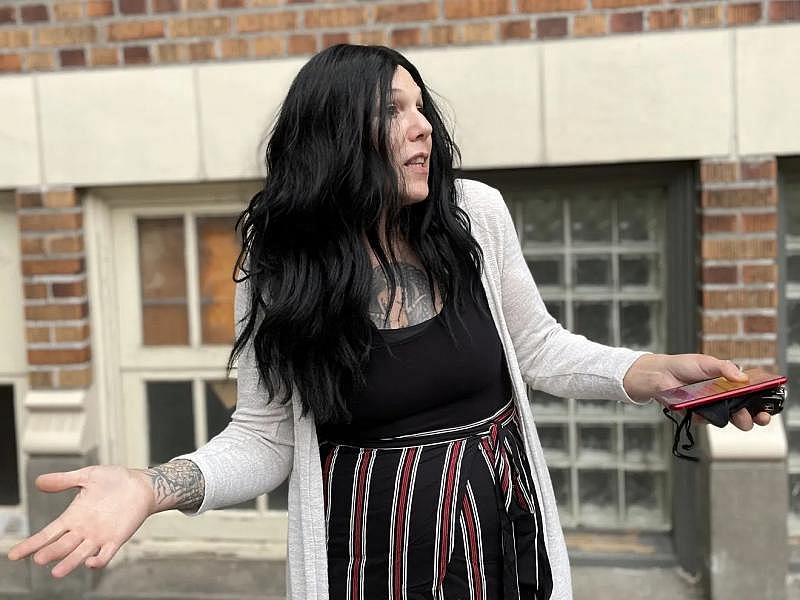
Adams was staying downtown because his pregnant girlfriend was living nearby in temporary housing provided by the street outreach group Outside In, which also has a needle exchange.
Ria Tsinas, an Outside In needle exchange worker, said she can’t keep up with the demand from homeless people seeking syringes, needles and alcohol pads to stay safe while they shoot up.
She had to close her office at 5 p.m. on a Friday, but people were still banging on the door for help an hour later. It shows Oregon’s new drug reform isn’t enough, Tsinas said.
“It’s like they put the cart before the horse,” she said. “What people want is a place to go.”
As drug users walked away from the site empty-handed, Tsinas said she sometimes doubts whether she’s doing any good. She recounted scenes of despair: People sleeping in the streets, doing drugs, in the grips of severe mental illness. Untreated and alone.
People, she said, the world left behind long ago.
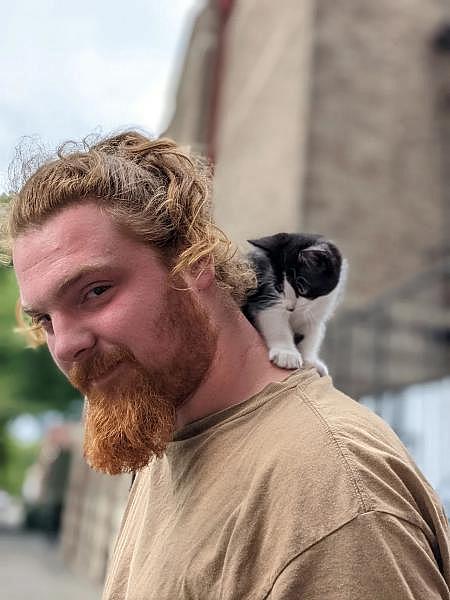
Jerry Adams, who this summer was living in a tent in downtown Portland, poses with his cat. Casey Toner / BGA

John M. Haroldson, district attorney for Benton County, Oregon, outside the courthouse in Corvallis. Jared Rutecki / BGA
Most prosecutors opposed Measure 110
One vocal opponent of the drug-reform measure was John Haroldson, the district attorney in Benton County, home of Oregon State University.
Haroldson said the state should have continued to use drug courts for low-level possession cases instead of decriminalizing those offenses. Drug courts have been used in Oregon for decades and provide a “stick” to get treatment for users, he said.
“If people could stop using drugs on their own, then we wouldn’t have a problem,” Haroldson said.
In Cook County, the courts and police have programs to divert some drug offenders away from prison, but they do little to stop the churn of dead-end drug arrests. Cook County’s drug-court treatment program, for instance, is focused on providing help for those already on probation.
In Oregon, Haroldson said, supporters promoted Measure 110 on a “false premise” it would keep people out of prison. He was among 25 of Oregon’s 36 district attorneys who opposed the ballot initiative.
Since 1989, Haroldson said, people convicted of low-level felony drug possession offenses were sentenced to probation and when they violated the conditions of their probation they were sent to the county jail for up to six months.
Then, in 2017, low-level possession offenses were reduced to misdemeanors.
Before voters approved the ballot measure last year, Haroldson said, cities in Oregon already had programs in which people arrested for drug possession weren’t charged and were referred for treatment.
Haroldson said he hopes Measure 110 will have a positive impact, but he’s “concerned” because he doesn’t think it’s based on an evidence-based approach like drug courts.
“I imagine you’ve seen what Portland looks like,” he said of the widespread homelessness and drug use. “Ask yourself: How’s that working out?”
Deschutes County District Attorney John Hummel in his office in Bend, Oregon. Joe Kline / Sun-Times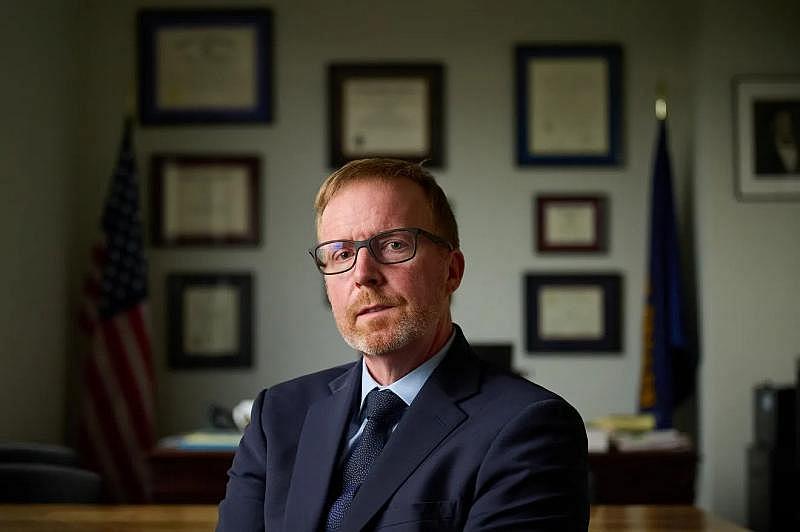
‘Hope to never see you again’
John Hummel, the district attorney of Deschutes County in central Oregon, strongly supported Measure 110 and still does.
Hummel, who began his career as a public defender and worked in healthcare policy for low-income people, said his background affected his policies when he was elected top prosecutor in 2014.
“I already had the mindset that the war on drugs has been a failure, and we need to just wave the white flag,” he said.
Deschutes County, whose biggest city is Bend, draws tourists for skiing, white-water rafting and mountain biking, but this health-conscious area is grappling with drug problems, too, with many arrests for methamphetamine possession.
As district attorney, Hummel created a diversion program called Clean Slate to keep people who use drugs out of jail. Those with a low risk of getting rearrested are freed without charges and pointed toward health services.
“I shake your hand and say, ‘Good luck to you,’ ” Hummel said. “ ‘Hope to never see you again.’ ”
Those deemed likely to commit future drug offenses are assessed for possible substance-abuse disorders and other health issues. They can go to clinics that offer everything from dental care to drug treatment and housing assistance. If they participate and stay crime-free, their arrests are expunged.
Hummel said Clean Slate has reduced the number of drug users he sees again in court. Fewer than 20% of “low risk” people have reoffended over the past three years, and fewer than 60% of the rest did. That reduced the number of drug-related crimes like thefts, Hummel said.
“Now, we’re freeing up time to work on the child sex abuse, domestic violence,” he said.
Hummel said he’s continuing to offer Clean Slate to people arrested for higher drug amounts than those decriminalized by Measure 110.
Michelle Tobin in Pioneer Park in Bend, Oregon. She completed the Deschutes County Clean Slate program that keeps drug users out of jail. Joe Kline / Sun-Times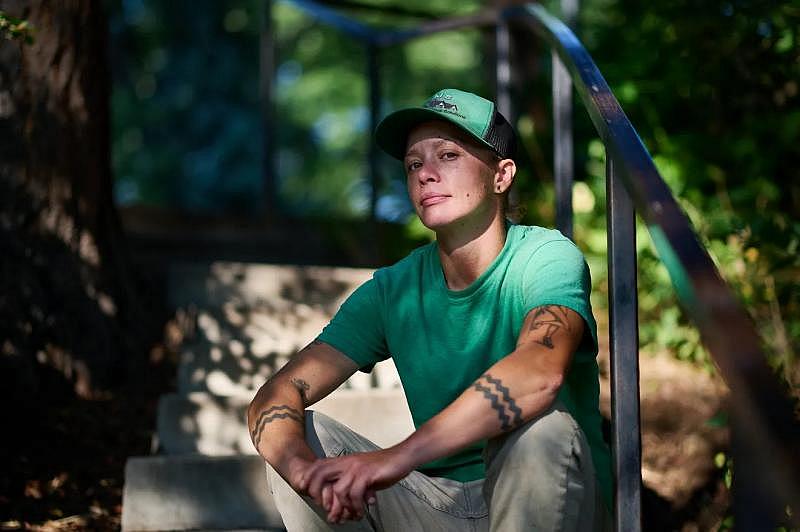
Michelle Tobin, a landscaper who’s been arrested for drug possession, is a Clean Slate graduate.
Tobin said she started using methamphetamine when she was a teenager. It helped with her attention deficit and was cheaper than prescription drugs, she said.
Last year, an officer pulled her car over on Super Bowl Sunday and found a pipe. Police said there was methamphetamine residue in it.
“I was crying,” she said. “You’re willing to go put me in jail for a f---ing pipe?’ ”
Instead of jail, she was admitted to Clean Slate.
“Technically, that case was never filed,” Tobin said. “So, like, if a cop pulled up my name, it wouldn’t say I had these charges as long as I completed this program. And I just had to go to my doctors’ appointments. It sets you up with counselors, therapists, whatever they feel that could be beneficial to you.”
She said Clean Slate might have kept her from losing her job.
“I didn’t have that humiliation of going to jail or the possibility of missing a court date and being thrown in jail if the judge was having a bad day,” she said.
This year, a friend of hers got caught with drugs, but the police didn’t arrest her because of Measure 110. The woman got into treatment because of the new law.
Tobin’s friend was one of 67 people to get a drug ticket in Deschutes County this year through the end of September, according to court records.
Tobin said it’s good that Measure 110 provides people across the state with the same opportunity to stay out of jail and get access to health services that she got in the county’s Clean Slate program.
“Decriminalizing, I think, is gonna help a lot,” she said.
Hummel said Oregon’s sweeping drug reform law represents a recognition that programs like Clean Slate work.
But he said the implementation of the law needs “tweaks.”
“So my friends around the state who were opposed to 110, if they see some piece of it that they think isn’t working, they go, ‘Ha ha!’ and do a little victory dance,” Hummel said. “What are they advocating for — going back to the system that has failed miserably since the founding of Oregon?”
If you don’t see a survey questionnaire above, click here to view it.
Frank Main is a reporter for the Chicago Sun-Times. Casey Toner and Jared Rutecki are reporters for the Better Government Association. This story uses data from The Circuit, an Injustice Watch and BGA courts data project, in partnership with civic tech consulting firm DataMade. The University of Southern California’s Annenberg Center for Health Journalism provided support for the project through a 2021 National Fellowship.
[This article was originally published by Chicago Sun-Times and Better Government Association.]



